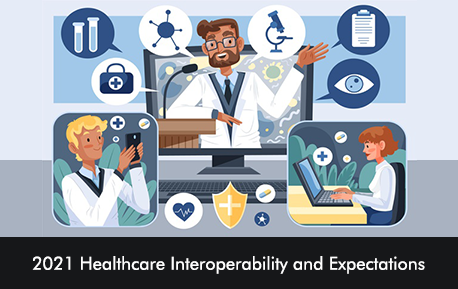2021 has marked the importance of health IT interoperability to move ahead with enhanced patient care, public health reporting, and seamless data exchange. The interoperability rule rolled out in March 2020 however the COVID-19 pandemic delayed the interoperability rule being applied which doesn’t mean it lost its importance. The implementation of the interoperability rule shortly will enhance the healthcare landscape by proving opportunities that will lead to greater patient data exchange and lead to groundbreaking innovation for medication management.
Health IT Interoperability in the Future
Healthcare interoperability gains importance as the world continues to navigate the COVID-19 pandemic. The interoperability rule will come into effect in July 2021 which means all hospitals and clinics in the US need to be prepared despite the pandemic.
Automation of clinical workflows by using Electronic Medical Records (EMR) Software systems will help in the accumulation of patient data in standard form from one provider to another.
One good thing that has come out of the COVID-19 pandemic is that healthcare professionals and governments know the importance of transparency in the healthcare sector. True interoperability is dependent upon the transparency of data that is shared across different stakeholders.
2021 Healthcare Interoperability and Expectations
- Telemedicine will continue to grow – Video sessions and remote patient care will continue to grow as patients are looking for effective and safe ways to get prompt diagnosis and treatment. Patients can get the right care, at the right time from the comfort of their homes keeping healthcare providers safe and reducing the burden on hospital staff and management. It is expected that Artificial Intelligence (AI) technology will further direct the healthcare sector which will enhance interoperability options.
- Improvements in providers and payers’ communication – With the interoperability rule being applied this July, healthcare professionals and payers will realize enhancement in their communication and also in data transparency and patient security.
- HIEs will develop – Health Information Exchanges (HIEs) will enhance as information blocks of the previous year won’t be a big hindrance this year. The standardized ERH requirement of the IT interoperability rule will improve patient privacy when data is exchanged across all care levels in the healthcare sector.
- Medication Management – Medication costs will rise in 2021. The COVID-19 vaccine rollout will continue to progress and the need for specialty medication will pole position this year. A great amount of interoperability will be required to administer and manage patient treatment processes.
As we progress into 2021 healthcare providers can be confident that the future of healthcare is shining due to interoperability. Technology will play a major role to provide efficient treatment options to patients and help streamline and clinical and administrative workflows. Software vendors, healthcare professionals, and lawmakers will delve into innovative ways despite the rocky healthcare landscape due to the pandemic – As they say crisis is the mother of innovation.







